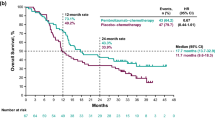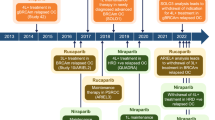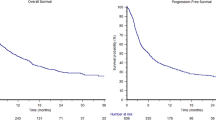Abstract
Intravenous liposomal irinotecan injection (Onivyde®) is approved for use in combination with 5-fluorouracil and leucovorin (5-FU/LV) in patients with metastatic pancreatic adenocarcinoma that has progressed following gemcitabine-based therapy. Liposomal irinotecan is a liposome-encapsulated formulation of the topoisomerase-1 inhibitor irinotecan, developed to overcome the pharmacological and clinical limitations of non-liposomal irinotecan. In the pivotal multinational, phase III NAPOLI-1 trial in patients with metastatic pancreatic adenocarcinoma that had progressed following gemcitabine-based therapy, liposomal irinotecan in combination with 5-FU/LV significantly prolonged median overall survival (OS; primary endpoint) and median progression-free survival (PFS) at the time of the primary analysis (after 313 events) and final analysis (after 382 events) compared with 5-FU/LV control therapy. The objective response rate was also significantly higher in the liposomal irinotecan plus 5-FU/LV group than in the control group. Liposomal irinotecan-based combination therapy had a manageable safety profile; the most common treatment-emergent adverse events (TEAEs) of grade ≥3 severity were haematological or gastrointestinal in nature. The incidence of neutropenic sepsis was low. In a setting where there is a paucity of second-line treatment options, liposomal irinotecan in combination with 5-FU/LV is an important emerging treatment option for metastatic adenocarcinoma of the pancreas that has progressed following gemcitabine-based therapy.
Similar content being viewed by others
References
Siegel RL, Miller KD, Jemal A. Cancer statistics, 2016. CA Cancer J Clin. 2016;66:7–30.
Carrato A, Falcone A, Ducreux M, et al. A systematic review of the burden of pancreatic cancer in Europe: real-world impact on survival, quality of life and costs. J Gastrointest Cancer. 2015;46:201–11.
Ducreux M, Cuhna AS, Caramella C, et al. Cancer of the pancreas: ESMO clinical practice guidelines for diagnosis treatment and follow-up. Ann Oncol. 2015;26(Suppl 5):v56–68.
Sohal DPS, Mangu PB, Khorana AA, et al. Metastatic pancreatic cancer: American Society of Clinical Oncology clinical practice guideline. J Clin Oncol. 2016;34(23):2784–96.
Passero FC Jr, Grapsa D, Syrigos KN, et al. The safety and efficacy of Onivyde (irinotecan liposome injection) for the treatment of metastatic pancreatic cancer following gemcitabine-based therapy. Expert Rev Anticancer Ther. 2016;16(7):697–703.
Ur Rehman SS, Lim K, Wang-Gillam A. Nanoliposomal irinotecan plus fluorouracil and folinic acid: a new treatment option in metastatic pancreatic cancer. Expert Rev Anticancer Ther. 2016;16(5):485–92.
Pharmacia and Upjohn Company LLC. Camptosar—(irinotecan) injection, intravenous infusion: US prescribing information. 2014. http://www.pfizer.com/. Accessed 2 Mar 2017.
Takahara N, Nakai Y, Isayama H, et al. Uridine diphosphate glucuronosyl transferase 1 family polypeptide A1 gene (UGT1A1) polymorphisms are associated with toxicity and efficacy in irinotecan monotherapy for refractory pancreatic cancer. Cancer Chemother Pharmacol. 2013;71:85–92.
Yi SY, Park YS, Kim HS, et al. Irinotecan monotherapy as second-line treatment in advanced pancreatic cancer. Cancer Chemother Pharmacol. 2009;63:1141–5.
Rocha Lima CM, Green MR, Rotche R, et al. Irinotecan plus gemcitabine results in no survival advantage compared with gemcitabine monotherapy in patients with locally advanced or metastatic pancreatic cancer despite increased tumor response rate. J Clin Oncol. 2004;22(18):3776–83.
Stathopoulos GP, Syrigos K, Aravantinos G, et al. A multicentre phase III trial comparing irinotecan-gemcitabine (IG) with gemcitabine (G) monotherapy as first-line treatment in patients with locally advanced or metastatic pancreatic cancer. Br J Cancer. 2006;95(5):587–92.
Grapsa D, Syrigos K, Saif MW. Nanoliposomal irinotecan for treating pancreatic cancer. Expert Opin Orphan Drugs. 2016;4(5):541–7.
Ko AH. Nanomedicine developments in the treatment of metastatic pancreatic cancer: focus on nanoliposomal irinotecan. Int J Nanomed. 2016;11:1225–35.
Zhang H. Onivyde for the therapy of multiple solid tumors. OncoTargets Ther. 2016;9:3001–7.
Conroy T, Desseigne F, Ychou M, et al. FOLFIRINOX versus gemcitabine for metastatic pancreatic cancer. N Engl J Med. 2011;364(19):1817–25.
European Medicines Agency. Onivyde (liposomal irinotecan) 5 mg/ml concentrate for solution for infusion: EU summary of product characteristics. 2016. http://www.ema.europa.eu/. Accessed 2 Mar 2017.
Merrimack Pharmaceuticals Inc. Onivyde™ (irinotecan liposome injection), for intravenous use: US prescribing information. 2015. http://www.onivyde.com/. Accessed 2 Mar 2017.
Australian Government Therapeutic Goods Administration. Public summary: Onivyde irinotecan (as sucrosofate) 43 mg/10 mL nanoliposomal concentrated injection for infusion. http://www.ebs.tga.gov.au/. Accessed 2 Mar 2017.
PharmaEngine. R&D pipeline about PharmaEngine—Onivyde™ (nal-IRI, MM-398, PEP02). http://www.pharmaengine.com/. Accessed 2 Mar 2017.
Drummond DC, Noble CO, Guo Z, et al. Development of a highly active nanoliposomal irinotecan using a novel intraliposomal stabilization strategy. Cancer Res. 2006;66(6):3271–7.
Hsueh CT, Selim JH, Tsai JY, et al. Nanovectors for anti-cancer drug delivery in the treatment of advanced pancreatic adenocarcinoma. World J Gastroenterol. 2016;22(31):7080–90.
Kalra AV, Kim J, Klinz SG, et al. Preclinical activity of nanoliposomal irinotecan is governed by tumor deposition and intratumor prodrug conversion. Cancer Res. 2014;74(23):7003–13.
Kang MH, Wang J, Makena MR, et al. Activity of MM-398, nanoliposomal irinotecan (nal-IRI), in Ewing’s family tumor xenografts is associated with high exposure of tumor to drug and high SLFN11 expression. Clin Cancer Res. 2015;21:1139–50.
Chang TC, Shiah HS, Yang CH, et al. Phase I study of nanoliposomal irinotecan (PEP02) in advanced solid tumor patients. Cancer Chemother Pharmacol. 2015;75(3):579–86.
Schaaf LJ, Hammond LA, Tipping SJ, et al. Phase 1 and pharmacokinetic study of intravenous irinotecan in refractory solid tumor patients with hepatic dysfunction. Clin Cancer Res. 2006;12(12):3782–91.
De Jong FA, de Jonge MJA, Verweij J, et al. Role of pharmacogenetics in irinotecan therapy. Cancer Lett. 2006;234:90–106.
Lokiec F, Canal P, Gay C, et al. Pharmacokinetics of irinotecan and its metabolites in human blood, bile, and urine. Cancer Chemother Pharmacol. 1995;36(1):79–82.
Chen L-T, Li C-P, Chiu C-F, et al. Efficacy and safety of nanoliposomal irinotecan (nal-IRI, MM-398, PEP02, BAX-2398) in patients with metastatic pancreatic cancer in Asia: a subgroup analysis of the phase 3 NAPOLI-1 study [abstract no. 221PD]. Ann Oncol. 2016;27(Suppl 9):ix69–70.
Wang-Gillam A, Li CP, Bodoky G, et al. Nanoliposomal irinotecan with fluorouracil and folinic acid in metastatic pancreatic cancer after previous gemcitabine-based therapy (NAPOLI-1): a global, randomised, open-label, phase 3 trial. Lancet. 2016;387:545–57.
Chen L-T, von Hoff DD, Li C-P, et al. Expanded analyses of napoli-1: phase 3 study of MM-398 (nal-IRI), with or without 5-fluorouracil and leucovorin, versus 5-fluorouracil and leucovorin, in metastatic pancreatic cancer (mPAC) previously treated with gemcitabine-based therapy [abstract no. 234]. J Clin Oncol. 2015;33(Suppl 3):234.
Chen L-T, Wang-Gillam A, Li C-P, et al. Final results of NAPOLI-1: a phase 3 study of nal-IRI (MM-398) ± 5-fluorouracil and leucovorin (5-FU/LV) vs 5-FU/LV in metastatic pancreatic ductal adenocarcinoma (mPDAC) previously treated with gemcitabine-based therapy [abstract no. 622PD plus poster]. Ann Oncol. 2016;27(Suppl 6):622PD.
Pelzer U, Blanc J-F, Melisi D, et al. Quality-adjusted survival with combination nal-IRI + 5-FU/LV vs 5-FU/LV alone in metastatic pancreatic cancer patients previously treated with gemcitabine-based therapy: a Q-TWiST analysis. Br J Cancer. 2017. doi:10.1038/bjc.2017.67.
Chen L-T, Siveke J, Wang-Gillam A, et al. Safety across subgroups in NAPOLI-1: a phase 3 study of nal-IRI (MM-398) ± 5-fluorouracil and leucovorin (5-FU/LV) versus 5-FU/LV in metastatic pancreatic cancer (mPAC) previously treated with gemcitabine-based therapy. Ann Oncol. 2016;27(Suppl 2):ii102–ii17.
Hubner RA, Chen L-T, Siveke JT, et al. Time course of selected treatment-emergent adverse events (TEAEs) in NAPOLI-1: a phase 3 study of nal-IRI (MM-398) ± 5-fluorouracil and leucovorin (5-FU/LV) vs 5-FU/LV in metastatic pancreatic cancer (mPAC) previously treated with gemcitabine-based therapy [abstract no. 693P plus poster]. Ann Oncol. 2016;27(Suppl 6):693P.
Shire. Shire granted EU marketing authorization of Onivyde®, in combination with 5-fluorouracil (5-FU) and leucovorin (LV), for the treatment of metastatic adenocarcinoma of the pancreas in adult patients who have progressed following gemcitabine-based therapy [media release]. 2016. http://www.prnewswire.com/.
National Comprehensive Cancer Network®. NCCN clinical practice guidelines in oncology: pancreatic adenocarcinoma version 2.2016. 2016. http://www.nccn.org/. Accessed 2 Mar 2017.
Acknowledgements
During the peer review process, the manufacturer of liposomal irinotecan was also offered an opportunity to review this article. Changes resulting from comments received were made on the basis of scientific and editorial merit.
Author information
Authors and Affiliations
Corresponding author
Ethics declarations
Funding
The preparation of this review was not supported by any external funding.
Conflict of interest
Yvette Lamb and Lesley Scott are salaried employees of Adis/Springer, are responsible for the article content and declare no relevant conflicts of interest.
Additional information
The manuscript was reviewed by: D. Grapsa, Oncology Unit, 3rd Department of Medicine, Sotiria Athens General Hospital, Athens University School of Medicine, Athens, Greece; M. Harris, Department of Medical Oncology, Monash Health, East Bentleigh, Victoria, Australia; C.-T. Hsueh, Division of Medical Oncology and Haematology, Department of Internal Medicine, Loma Linda University, Loma Linda, CA, USA; E. M. O’Reilly, David M. Rubenstein Centre for Pancreas Cancer Research, Department of Medicine, Memorial Sloan-Kettering Cancer Centre, New York, NY, USA; T. Seufferlein, Department of Internal Medicine I, University of Ulm, Ulm, Germany.
Rights and permissions
About this article
Cite this article
Lamb, Y.N., Scott, L.J. Liposomal Irinotecan: A Review in Metastatic Pancreatic Adenocarcinoma. Drugs 77, 785–792 (2017). https://doi.org/10.1007/s40265-017-0741-1
Published:
Issue Date:
DOI: https://doi.org/10.1007/s40265-017-0741-1




